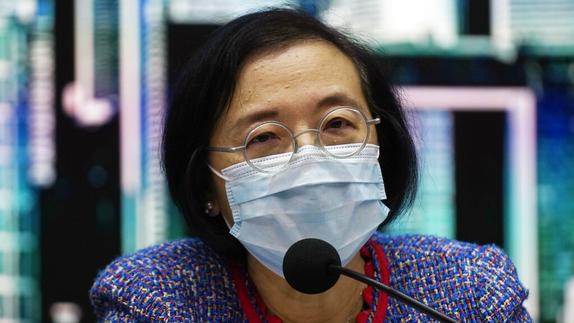 Hong Kong Secretary for Food and Health Sophia Chan Siu-chee listens to a reporter's questions during a news conference in Hong Kong, Nov 11, 2020.
(VINCENT YU/AP)
Hong Kong Secretary for Food and Health Sophia Chan Siu-chee listens to a reporter's questions during a news conference in Hong Kong, Nov 11, 2020.
(VINCENT YU/AP)
HONG KONG - To address the “severe shortage” of doctors, the Hong Kong Special Administrative Region government is eyeing a “new pathway” for more non-locally trained doctors to register and practice in the city, Secretary for Food and Health Sophia Chan Siu-chee said on Wednesday.
In a written reply to a query at the Legislative Council (LegCo), Chan said the government would introduce a bill in the second quarter of the year that would allow “special registration” for non-locally trained doctors.
Secretary for Food and Health Sophia Chan said the government would introduce a bill in the second quarter of the year that would allow “special registration” for non-locally trained doctors
“The government considers it necessary to create a new pathway under the existing Medical Registration Ordinance to allow more qualified non-locally trained Hong Kong doctors to practice in our public healthcare sector so as to increase the supply of doctors in Hong Kong,” Chan said.
Under Chan's proposal, the non-locally trained doctor should be a Hong Kong permanent resident and a graduate of a recognized medical school outside HK to qualify.
ALSO READ: Overseas-trained doctors back plan to scrap licensing exam
The doctor should also be a registered medical practitioner or has obtained a specialist qualification in any country or region where the recognized medical schools are located.
Chan added that an applicant should have also been employed full-time in any of the local public healthcare institutions like the Hospital Authority, the Department of Health, the University of Hong Kong, and the Chinese University of Hong Kong.
“The proposed requirement for an applicant to have been registered as a medical practitioner or obtained a specialist qualification in the country or region where the recognized medical schools are located is meant to ensure that his or her standard of practice has been recognized,” Chan said.
She said non-locally trained doctors who are registered specialists and whose qualifications are recognized by the Hong Kong Academy of Medicine may apply for full registration after working in public healthcare institutions for a specified period and passing an on-the-job assessment.
ALSO READ: HK doctor cleared in massive securities fraud probe
For those who have yet to receive specialist training, they will have to complete it in Hong Kong, which normally lasts for at least six years, Chan said.
She added that those who have attained a qualification comparable to the pre-intermediate/intermediate exams of constituent Colleges of the HKAM will also have to continue the remaining specialist training in the city.
“After obtaining a recognized specialist qualification from the HKAM, they are required to work in the public healthcare institutions for a specified period and pass the on-the-job assessment before they can apply for full registration,” Chan said.
Cross-boundary Travel
Meanwhile, Chan also said in a reply to a separate query at the LegCo that that HKSAR government had started technical discussions with the Guangdong provincial government on interfacing relevant COVID-19 vaccination records to facilitate the gradual resumption of cross-boundary travel.
“We have already commenced technical discussion on the interfacing of vaccination records and technology platform with the Guangdong provincial government to enhance the interconnectivity of relevant digital records and technology platform,” Chan said.
READ MORE: Demystifying the myths around doctor shortage
She said the HKSAR government was also liaising closely with the authorities in the mainland and the Macao Special Administrative Region government on disease prevention and control measures, and arrangements for cross-boundary travel for residents of the three places.
“We are actively exploring the resumption of normal cross-boundary activities among residents of the three places in a gradual and orderly manner when the epidemic situation in the three places is under control and without increasing public health risks,” Chan said.


